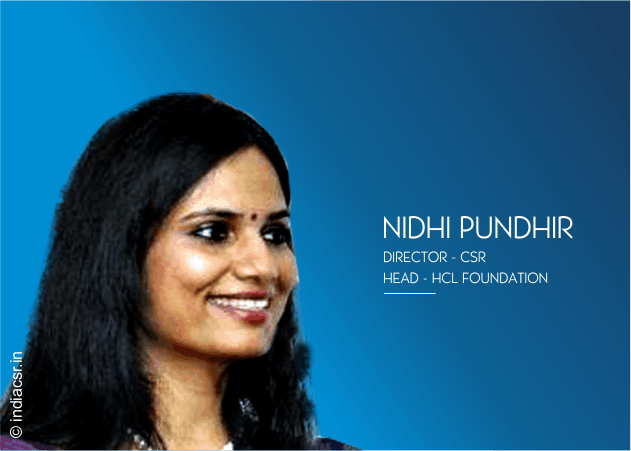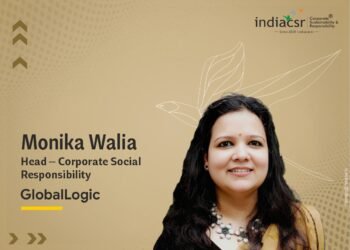Nidhi Pundhir has close to two decades of experience on actualising Rights of Children at state, national, continental and global levels. Her focus has been Child Rights Situation Analysis that includes programme development, execution, monitoring & evaluation, advocacy, networking, identification of best practice, policy reform, training & development and strategy. Pundhir shares her thoughts with Apresh Mishra.
How far we have travelled on the state of menstrual health in India?
Let me start with the point of demographic dividends. We are a country with over 1.3 billion people. We represent almost one seventh of the world. Now the issue here is, with 50% being women and girls, are we ready to address the issue of menstrual hygiene and if yes, how should we do that?
By the age of 10-11, women achieve puberty. It’s how the policies are crafted that actually takes over the reproductive burden. In Africa and Asia, unfortunately, sexual and reproductive health are not being treated equally. In India, we are fortunate that we don’t have problems like female genital mutilation and things like that. Here, we have lesser of the burden, but the burden is big enough to keep the good aspects out of mainstream.
Sadly, menstrual cycle which is so normal and natural, sometimes leads to lack of access to the majority of females. In a country that is full of absolutely amazing talented girls, if they are kept out of mainstream life because we cannot deal with menstrual health issue, we are actually losing out on our own country’s talent.
In rural areas as well as in urban, availability of toilets for girls in the schools and many other places is dismal. Even the toilets that have been constructed do not have functional incinerators. Then there’s no private place to change the pads. There is a need for educating the women and girls to actually use the right methods to protect themselves by following the right menstrual hygienic practices. Also, education in this area needs to become a part and parcel of the regular curriculum.
It has to be taken as normal as breathing. So, the approach needs to be somewhat different. The moment you come to the family level, it still becomes a hush-hush issue, same is when you go to a classroom.
We at HCL Foundation have been able to break this barrier in some areas. We have been able to break the silence in the programmes where we are working with the adolescents. I can take you to a classroom where girls and boys actually show you how to make a sanitary napkin. Recently, our chairperson was visiting one of the schools where a girl made a sanitary napkin—it was a classroom of 50-60 students with 30 to 40% boys.
In Noida, we are working in the schools, where we do plays, interestingly, boys come out and be a part of such plays. And many of the boys who are spear leaders, they have insight. They actually talk about it as a social responsibility where they have taken the onus upon themselves that girls should not drop out from school because of this natural cycle in females. Some kind of equality is slowly being fostered.
The second level of intervention is at the community level, where women have learnt to make sanitary napkins which may cost less than Rs 2. They earn from whatever they can sell. The sanitary napkins of high-end brands are out of reach for them.
The dated methods of cloth, etc, are unhygienic too. In some situation, there’s no place to dry them as well. We have to look at a solution which works for the community. The high-end branded sanitary napkins, at times are not disposed of properly. As a consequence, they create a big issue in solid waste management, adding to the larger solid waste management problem. That’s why we have looked at incinerators in the schools.
We are also looking at low cost methods of disposal. We’re also looking at reusable sanitary napkins, so that, one social burden doesn’t lead to another. It’s a bit of a comprehensive approach which we’ve packaged everything in a programme called My Worth, where we are looking at women and girls as a Worth.
It’s a very good programme for both boys and girls to be able to deal with each other, to be able to talk to each other, to be able to form a gender equitable society. So, it’s a self-efficacy based model where we work on seven different aspects of adolescents. We are working on things of negotiation skills, time management, presentability, analyze the budgets, for example, for the financial inclusion aspects for them and then the family life and wellbeing.
HCLites is involved with training first and then as trainers, they are involved in training the community. So, it’s a volunteering engagement cum sustainable development programme. They’re very serious people who have actually understood the concept, they then work with the young people directly under HCL Foundation’s supervision and are able to bring them out of their situations.
Like we’ve had cases where women and girls were stuck to their own marriage or the marriage of their sisters, which were the cases of child marriages and quite a few of such child marriages have been stopped. Many girls who actually dropped out of school because of menstrual cycles have got back to school. When we look on infrastructure, we work on community level awareness. We work on linking it with the healthcare system of the government.
What are the locations?
One big chunk of programme is running in the urban slums of Noida. These are state schools, that is, government schools. There are 87 schools in Noida, then we have community where we are dealing with almost 10,000 – 15,0000 direct adolescents.
In Lucknow, we have quite a big intervention. In Chennai, Bangalore, Hyderabad too. It’s a programme called Uday, which is under HCL CSR and we actually run this programme in all the cities where HCL has its presence.
We work with the people in abject poverty who either live in slums or street children who have to work for living. So, it’s a programme that addresses people in acute poverty and menstrual hygiene is one reason where girls can be further pushed back to poverty. And that’s where we, this is one of our areas where, rather I would say this is one of the barriers we, identify in gender equity.
How do you want the new government to prioritize menstrual health?
Well, irrespective of which political party the government belongs to, it is the duty of the government to ensure and prioritize this. There is a concept in the human rights framework that we identify the stakeholders and educate them.
The government has good schemes for girls and women empowerment. These schemes need to be implemented effectively on ground, and that’s where the success of any scheme lies. These need to reach out to the right beneficiaries and to the people who are out of mainstream.
There are enough success stories and case studies in our country. We have certainly come a long way. Today we see advertisement of sanitary pads on TV, families do watch them, young girls and boys are aware of what it is. Girls today attend school even during their menstruation days. So many women are working during those days. Let’s give due credit to the work that has happened over the years.
Now, we are talking about the ones who are in critical situation of socio-cultural poverty, and not just in economical poverty. This socio-cultural poverty needs to be addressed. There are segments of community, segments of people who need to be brought into the mainstream. A scheme needs to be designed and scaled so that it addresses that issue.
Imagine if somebody needs to change sanitary pads 4 -5 times in a day, where will she be able to do so? There is no washroom. Even if there are washrooms, these are non-functional. And running a washroom can’t be only state’s responsibility. That’s where communities also have to take ownership.
When we work in HCL Foundation, though we are definitely not at the scale at which government is and we can never be at the scale what Government can offer, so eventually the onus is with the government. However, from CSR what we are trying to do is, we are trying to innovate models of implementation, very successful strategies and very good implementation source code.
But the wide scale in which government can do is beyond us. That’s why I am saying that, all the governments present and in the past, have tried and have been trying. There has been an adolescent programme which has been integrated with the ICDS system. But the adolescents need a voice in the system.
Are the older women covered programmes on menstrual health?
Under ANC and PNC they are covered. We are working with Self-Help Groups with women because when it comes to hygiene, it is very much the issue of the whole reproductive health. It is the 15 to 45 age group, which is treated in reproductive health programme.
So, the programmes that are running pretty much cover that age group. Adolescents have been the focus, because that’s when the whole behavioral change starts happening.
It’s very difficult to change the behavioral practices once they have gotten into it. Therefore, we have still been quite successful in dealing with the late age group, especially when you run with Maternity health programme or when you run it with the STD or RTI kind of programme. Because a lot of sexually transmitted diseases or the reproductive tract infections are reported to the gynecologist, which has zero relation with the actual sexual health, which is basically to do with menstrual hygiene. So, one has to think about this in a very integrated way and include it everywhere.
At least talk about the hygienic practices in every community where you have men and women working together. At the end of it, it is the chemist who is giving the pad. We all live together; we don’t live separately with women’s chambers.
There are children growing up, adolescents growing up; it’s pretty much a community kind of approach one needs to take up and break the taboo. Breaking the taboo is extremely important; a woman colleague should be able to tell a male colleague, that she is going through a different phase, and things like that.
Do you see it as a behavioral problem or there are other issues?
Cultural taboos are there, there are lots of myths that exist – there are cultural myths which have existed for centuries. Don’t touch the pickle, don’t touch a plant and you are dirty and things like that. Manifestation of culture as long as it takes to build, it takes much longer to break it as well.
So, it is not an easy thing right away, the moment you get into the religious, and the cultural aspects you need to involve the religious leaders. How many priests would allow a woman to sit for a puja or any other religious ceremony.
So, there is a lot of myths that are breaking, which is happening already. It is happening but it’s not that it is the end of this story; we need to keep doing it.
There is a behavioral problem, a societal problem. What about the economic one?
The economics of not addressing menstrual hygiene is huge. You will lose 50% of the demographic dividend, which we usually lose. It is only recently that women have joined. Even now we don’t have them at the apex. They are still not mainstream.
How many managers and CEOs do you know are women. At the middle level, they start to disappear somewhere. Even in sports. Because we are paying the price of not having addressed it earlier. And as a country this will pull us back. The thing that can work in our favour is working against us because we are carrying that burden of a force which could not be converted into a workforce.
What are the three priority areas?
First, we have to look at an integrated approach. We can’t have a standalone menstrual hygiene programme, when you are thinking of health programme, when you are thinking of menstrual hygiene; when you are thinking of education. Don’t plan anything in silos, that’s not going to work because women are everywhere.
When you think of a workspace, think about menstrual hygiene. Keep a kind of an indicator. We are talking about an age group of 11 to 50, they are everywhere – they’re in schools, they’re in hospitals, they are at home. They are 50% of women who represent us. So, how can we not plan for something as critical as menstrual cycle and then menstrual hygiene. Hence, an integrated approach would be needed.
Secondly, budgets need to be kept aside. We cannot deal with the issues without having any financial allocations. Third, crystal clear implementation is needed.
These are from a programme point of view. From a socio-cultural and behavioral point of view, mass scale change is important. Media needs to come on board as a partner, not just as a disseminator of information, but as a clear partner as a part of a mass communication.
This is true for any socio-cultural issue. Social development is an equal responsibility of media – myths, taboos need be avoided. Media has that power. Take one taboo and talk about it – is it really a taboo or a myth. Those are critical to change. It cannot be the responsibility of only government or only CSR, or health system or education. There are certain topics which need to be looked at as convergent approaches.
Terms & Conditions: India CSR Network does not permit other Websites/Agency to copy or reproduce or reprint the above article/feature in any form or means.






















